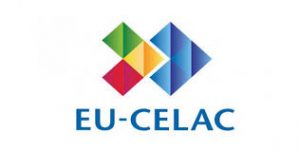2nd Meeting of the EU-Latin America and the Caribbean Working Group on Research Infrastructures
Vienna 11th–12th September 2018 – The 2nd meeting of the EU-Latin America and the Caribbean Working Group on Research Infrastructures was held in Vienna on 11th and 12th September 2018. The meeting was followed by the 1st Workshop on Research Infrastructures Strategy Road-Mapping Practices. Altogether 34 delegates from 29 EU and South American countries participated in the meeting. The road-mapping practices and selection of research infrastructures for study visits were discussed during the meeting.
EU-Latin America and the Caribbean Working Group on Research Infrastructures was constituted upon the Joint Initiative on Research and innovation EU-CELAC (EU-CELAC JIRI). It is intended to strengthen the cooperation between EU countries and Latin America and the Caribbean countries (LAC) in the field of research infrastructures. Delegates from Argentina, Brazil, Chile, Costa Rice, Cuba, Dominican Republic, El Salvador, Guatemala, Honduras, Mexico, Panama, Paraguay, Peru, Uruguay and Venezuela on the LAC side and Austria, Belgium, Bulgaria, Czech Republic, France, Italy, Luxemburg, Poland, Portugal, Romania, Sweden, United Kingdom and the European Commission on the EU side took part in the meeting. The main discussed topic was selection of the research infrastructures which will host the study visits and next steps in the study visits organization.
It is planned to realize 10 study visits in total, 5 of them on research infrastructure in EU and another 5 in the LAC countries. Expenses related to study visits will be covered by the European Commission. Research infrastructures management and policy makers are supposed to be the target groups of the study visit. On the 1st meeting the delegates were asked to propose research infrastructures for study visits and to choose up to 5 research infrastructures from delivered candidates. It was proposed 20 research infrastructures from EU and 40 from LAC countries in total. Following research infrastructures were chosen for the study visits:
European Union
- LifeWATCH ERIC (Spain)
- Institute for Health/Center for Systems Biomedicine/Integrated Biobank (Luxembourg) + BBMRI
- Beyond Nano + IOM (Italy)
- CIEMAT (Spain)
- EMBRC (Belgium/France)
Latin America and the Caribbean
- LNLS – Laboratorio Nacional de Sincrotrón (Brazil)
- CeNAT – Centro Nacional de Alta Tecnología (Costa Rica)
- Estación Patagonia UC – Pontificia Universidad Catolica de Chile (Chile)
- FIOCRUZ – Fundación Oswaldo Cruz (Brazil)
- CCT Conicet Bahia (Argentina)
Each study visit will consist of 10 participant whose participation will be covered by the European Commission. Preferences will be given to the participant from the country voting in favor of the research infrastructure and others (up to the limit) will be chosen based on the sequence of their applications. Participation above the limit will be possible, but the participant should cover all the costs. The final program of the study visits should be known at the beginning of October. Deadline of participant application will be in mid-October and study visits themselves will be held from December 2018 to March 2019.
In the frame of Working Group the Workshop on Research Infrastructures Strategy Road-Mapping Practices took place. The goals of the policy workshop were to get the LAC delegates acquainted with the European approach to the research infrastructure road-mapping (based on examples of European Strategy Forum on Research Infrastructures as well as national road-mapping procedures) and to give to the EU delegates the overview of actual research infrastructure road-mapping situation in the LAC countries. It appears that research infrastructure road-mapping in LAC countries is in very beginning and even the concept of research infrastructure itself is a little bit different from the European one.
Next meeting of the Working Group is supposed to be held in March 2019 on the topics of “Access Policies” and “Governance and Management of Research Infrastructures”.
